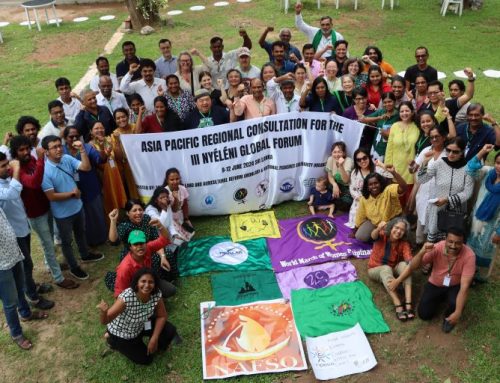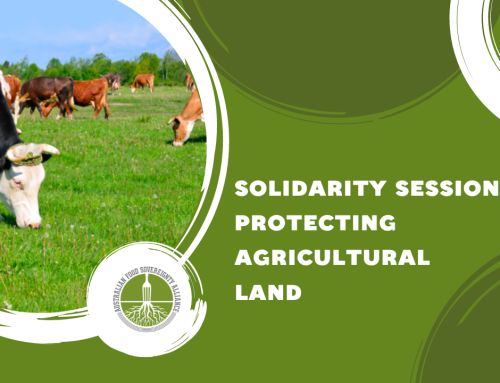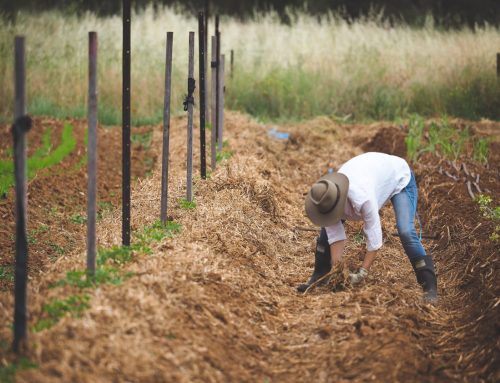EOI closes July 15th 2019
Here is a rare opportunity to work with food activists from around the world engaged directly with nation-states to secure the right to food and food sovereignty.
Are you (essential selection criteria)
- Based in Australia, New Zealand or Papua New Guinea, and a senior leader within a national or regional-scale civil society organisation, social movement, or network relating to food security and nutrition, with an irrefutable record in the struggle for your rights?
- Knowledgeable about food sovereignty and the right to food as well as food security and nutrition related policies, laws, and programs in your region?
- Able to demonstrate commitment to the organizing principles of the Mechanism, especially inclusiveness and prioritising input from those most affected by hunger and malnutrition
- Able to demonstrate exemplary communication and networking skills, able and willing to network with a broad range of constituencies, organisations, networks and sectors?
- Able to participate regularly in Committee meetings in person or via teleconference and video conferencing facilities (around half a day a week over the year) and be available to travel to Rome twice a year in May and October) for about 3 weeks in total, starting from October this year?
- Committed and available to be an active member of the Committee and to be proactive in facilitating the participation of members of their constituency or sub-region in the Mechanism and in the work of the CFS.
The CSM Coordinating Committee is committed to gender balance, ensuring geographic balance over time, and most importantly to ensuring the voices of those most affected by food insecurity are heard. In Australasia there is strong recognition that Indigenous peoples across the region are often the most impacted by policies and structures that undermine their right to food and food sovereignty. These considerations will be reflected and factored into the choice of candidate for the Australasian delegate.
Prior involvement or knowledge of the UN CFS and Civil Society Mechanism will also be considered. However in recognition of the relatively low level of knowledge of this part of the UN in our region, enthusiasm and willingness to learn and time commitment to help build our region’s connection are more important, and those without prior knowledge should not be discouraged from applying if you fit the other requirements. Younger members of food producers’ organisations are especially encouraged to apply.
The Coordination Committee Member Role:
- Consult with organisations and movements in your region (Australia, NZ/Aotearoa, Papua New Guinea) about your struggles around food and agriculture, including legal and policy issues, government and grassroots initiatives and programs.
- Bring these issues and initiatives to the Civil Society Mechanism for sharing, discussion, and political coordination.
- Communicate what is happening at the CFS and in the CSM to organisations and movements in your region, and use this information to collectively build political strategies to engage with national and sub-national governments to improve smallholder food producers’ rights to political participation in decisions that affect their lives.
- Help regional activists and organisations to understand and use the policy tools produced by the CFS in their struggles.
- Build awareness and engagement of food sovereignty activists, organisations and networks in our region with the work of the CSM.
- Liaise and work with regional civil society organisations (CSOs) in their international food sovereignty work.
- Crucially, as a CC member, you do not represent your region. Your mandate is to facilitate communication and consultation of all CSM constituencies* within your region in relation to CFS policy processes, through the Civil Society and Indigenous People’s Mechanism (CSM).
- Through a commitment to facilitation, rather than representation, the core mandate of the CSM as an inclusive space of participation is respected and fulfilled.
Time commitment and activities:
- The mandate is for 2 years: October 2019 -2021 and can be renewed once for a maximum of 4 years.
- Committee meetings in person or via teleconference and video conferencing facilities (around half a day a week over the year)
- In addition to online work through skype and email, you will need to be able to travel to Rome twice per year in May and October for about 3 weeks in total, starting from October this year to attend:
- A Coordinating Committee meeting for 2-3 days plus travel that usually happens in May.
- Coordinating Committee and CSM preparatory meetings plus the CFS annual Plenary for a total of about 10 days plus travel, that happens in October around the time of the World Food Day (October 16th).
While the role is voluntary, travel costs to Rome (flights, accommodation) are fully covered and you receive a decent daily stipend for time in Rome to cover food and internal transport costs, and sundries.
Organisational support and mentorship
The Australian Food Sovereignty Alliance (AFSA) has been participating in the CSM since 2015, and has also held the CC seat at various times. Anisah Madden, AFSA International Liaison, is currently the alternate CC member for Australasia for Carl Hutchby of Poutini Waiora. Anisah is based in Rome until December 2019, and will support the orientation of the new CC member, and accompany them in their first CC meeting in October.
The CFS and CSM and how they work in brief:
The Committee on World Food Security (CFS) is a UN Committee, hosted by the UN Food and Agriculture Organisation since 1974. Since its reform in 2009, it is widely recognised as the primary global food and agriculture policy making space. Its mandate is to facilitate policy convergence by governments towards the progressive realisation of the human Right to Food.
Like other UN bodies, member states (national governments) have exclusive decision-making rights. However, the CFS reform involved the creation of a uniquely inclusive institutional structure which allows non-state actors participation rights in policy development and debate.
At the heart of this mandate is the goal to meaningfully include the voices of those most affected by food insecurity and malnutrition in decisions that affect their lives. These same people – primarily rural women around the globe – also produce more than 70% of the world’s food and are the primary stewards of global biodiversity. These people’s organisations and movements participate in the Committee through the Civil Society and Indigneous People’s Mechanism.
The Civil Society and Indigenous People’s Mechanism (CSM) was created in 2009 to facilitate participation of those most affected by neoliberal food and agriculture policies – the small-scale food producers of the world, especially indigenous peoples, local communities, women and young people, as well as food workers, the landless, and urban food insecure – in the activities of the UN Committee on World Food Security. Consumer organisations and NGOs also participate in the Mechanism, in a more supportive role.
Priority is given to the social and political movements led by small producers. The creation of the CSM was made possible through the sustained efforts of transnational grassroots social movements and civil society organisations, many of whom are members of the International Planning Committee for Food Sovereignty (IPC) and/or La Vía Campesina, (LVC) the transnational peasant movement.
* All participating organizations in the CSM belong to one of the following 11 constituencies: smallholder farmers, pastoralists, fisherfolks, indigenous peoples, agricultural and food workers, landless, women, youth, consumers, urban food insecure and NGOs.
Expressions of Interest:
Please email Anisah Madden international@afsa.org.au by July 15, 2019 with an expression of interest, or for more information. This expression of interest should be in the form of a letter of no more than 2 pages responding to the Selection Criteria listed above, and a CV outlining your experience, skills, and scope of work within the region. Please put CSM CC in the subject line of your email.
You may be required to be available for a skype interview. The successful applicant will be notified ASAP, and all applicants will be notified of the outcome of the process in a timely fashion.
Click here for the CSM CC draft terms of reference.




